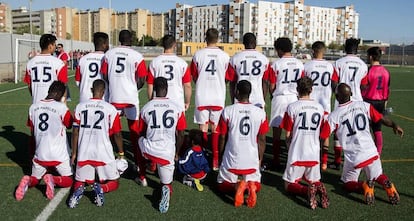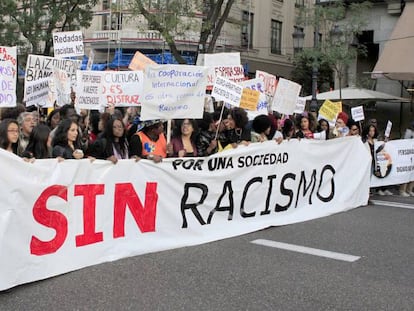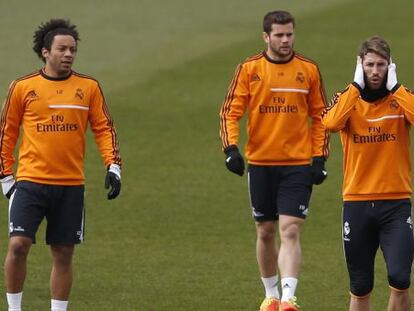Spanish soccer team prints racist slurs on jerseys to fight discrimination
Instead of their names, the players from Alma de África wore shirts bearing the insults they still get called during games


“What are we? A team! What are we? A family! Who are we? Alma de África!” That’s the cry being chanted in the dressing room of Alma de África (Soul of Africa), a Jerez-based soccer team in the Tercera Andaluza regional division. The team is made up of migrants from up to 12 different nationalities (at one point there were 15), and the five Spaniards in the group are affectionately known by their teammates as “the foreigners.”
We did it to tell everyone that we are not criminals. We are people and we are not bothering anybody
Alma de África soccer player Eric Josué Amang
The members of Álma de Africa are fed up with being called racist names when they play soccer games in Cádiz province and have come up with an innovative idea to take a stand against the abuse.
The players have decided to put the racist slurs on the back of their jerseys. Instead of their surnames, the jerseys have been printed with the words “Monkey,” “N*gger,” “Slave,” “Ape,” “Sudaca” (a derogatory name for someone from South America), “Undocumented migrant,” “Gorilla,” “Gypsy,” “Indian,” “Nigga,” “Illegal,” “Blackie,” “Scum,” “Immigrant” and “Black.”
The five-year-old team wore the jerseys for the first time on Sunday at the last game of the season.
“I played with the word ‘Monkey’ on my back. We did it to tell everyone that we are not criminals. We are people and we are not bothering anybody. We still hear these insults and it hurts us, as well as the professional players. Not long ago a player from the [Italian soccer club] Juventus stood up to an entire grandstand. I remember as well that [Cameroon soccer player with Spanish nationality Samuel] Eto’o was on the verge of stopping a game,” says Eric Josué Amang, a midfielder with Alma de África who arrived in Spain from Cameroon in 2013.
#Jerez #Deportes Los jugadores del Alma de África presentan una nueva camiseta con los insultos que reciben Vídeo: Vanesa Lobo https://t.co/Pma9KDpgdW pic.twitter.com/AGRZ17grPE
— Diario de Jerez (@diariodejerez) May 26, 2019
The players of Alma de África present their new jerseys with the racist slurs they are called. (Spanish audio)
“We want to be respected. We are in the 21st century and I don’t understand how they can still say these insults. We are fed up with being disrespected.”
Every player in Alma de África has a different back story. Eric’s began with a journey from Cameroon to Morocco, where he boarded a small boat headed to Spain. “I would not do it again for anything in the world,” he says. “I did two trips and the police picked me up. I spent a lot of money and finally was able to cross for €80. I was scared. A lot of friends and companions died on the journey. It was an incredibly hard experience.”
Soccer has helped him to build a new home in Spain. “Soccer helps you integrate. In Alma de África we are a family. I would do everything I could for this team. Soccer helps a lot,” he explains.
Eric now works in a slaughterhouse in Marchena, in Seville province, where he has lived for the past two years. Every weekend though he travels to play with his team. “I will always help,” he says. Many of his teammates do not have residency permits and play because the Andalusian Federation allows players to sign up with their passport.
We want to show that our players are so above these insults that we have put them on the back of their jerseys Team manager Alejandro Benítez
“We have tried to start an awareness campaign because all our players still receive racist insults. There are rude people who go after our players,” says Alejandro Benítez, a real estate agent who acts as president of Alma de África out of solidarity with the team. “It’s madness. We also want to show that our players are so above these insults that we have put them on the back [of the jerseys] so that everyone can see them. The initiative has been very well received,” he adds.
In many instances, the racist slurs come from the opposing team. “It is a stupid form of roguishness. Let’s see if together we can end this problem. It’s true that the trend is going down but it keeps happening and we wanted to draw people’s attention to it,” says Benítez.
“I think these type of things are unnecessary in sport and society,” says Issa Abdou, another member of the team, who left Cameroon when he was 14 and took three years to get to Spain. He jumped the border fence at Melilla, a Spanish exclave in North Africa, and was severely injured. Now thank to the soccer team, which helps the players find work, he has a job in IKEA.
Alma de África finished last in the division after losing the final game to Algaida, the team leader of the competition. In a gesture of goodwill, the players gave away their jerseys to their rivals.
English version by Melissa Kitson.









































